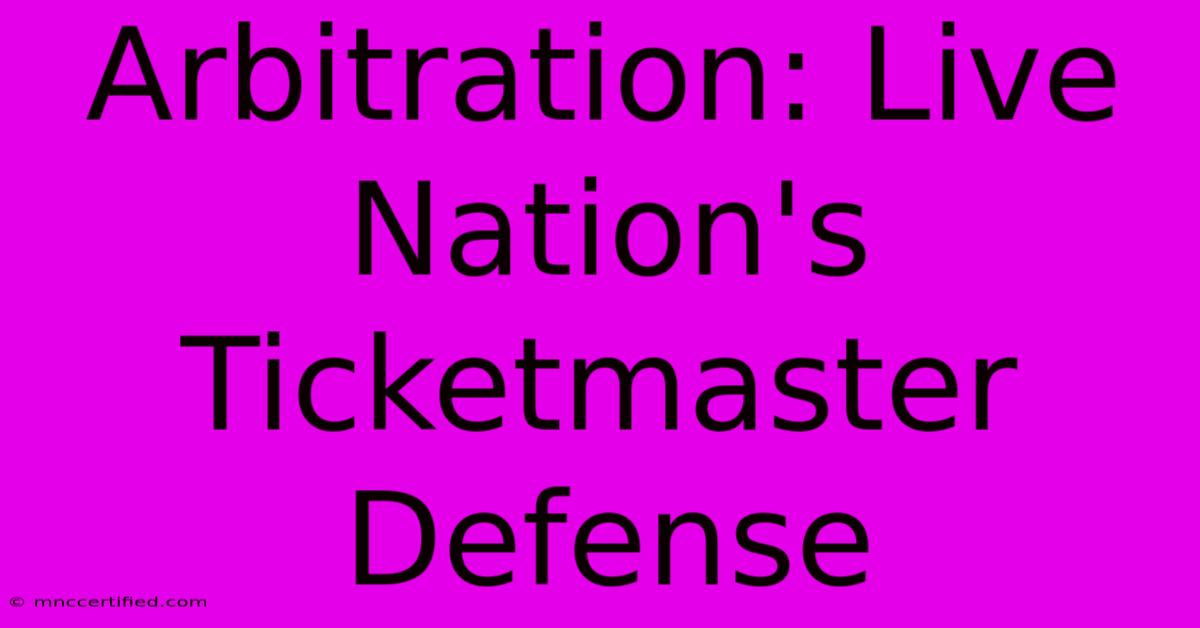Arbitration: Live Nation's Ticketmaster Defense

Table of Contents
Arbitration: Live Nation's Ticketmaster Defense – A Deep Dive
Live Nation Entertainment, parent company of the ticketing giant Ticketmaster, has increasingly relied on mandatory arbitration clauses in its terms of service to deflect lawsuits and criticism. This strategy, while legally sound, raises significant consumer protection concerns and fuels ongoing debate about the fairness and transparency of the arbitration process. This article will delve into Live Nation's use of arbitration, exploring its advantages and disadvantages, and analyzing its implications for consumers.
Understanding Mandatory Arbitration Clauses
Mandatory arbitration clauses are contractual agreements requiring parties to resolve disputes through private arbitration rather than public court litigation. These clauses are often included in fine print, easily overlooked by consumers purchasing tickets. For Ticketmaster, this means that instead of facing class-action lawsuits – which could cost millions – individual customers must pursue their claims individually in arbitration, a process often perceived as less favorable to consumers.
Advantages for Live Nation/Ticketmaster:
- Cost Savings: Arbitration is generally less expensive than litigation for companies like Live Nation, reducing potential financial penalties from lawsuits.
- Reduced Public Scrutiny: Arbitration proceedings are private, shielding Live Nation from negative publicity that could damage its reputation.
- Streamlined Process: Arbitration can, in some cases, be a faster and more efficient way to resolve disputes compared to lengthy court battles.
- Limited Discovery: The discovery process (gathering evidence) in arbitration is typically more limited than in court, potentially hindering plaintiffs’ ability to build strong cases.
Disadvantages for Consumers:
- Loss of Class Action Rights: Mandatory arbitration prevents consumers from joining together in class-action lawsuits, weakening their bargaining power against a corporate giant like Live Nation. This effectively silences many potential claims.
- Higher Costs for Individuals: While arbitration might be cheaper for corporations, individual consumers often bear higher costs, making it financially prohibitive to pursue claims.
- Limited Remedies: Arbitrators may be less inclined to award substantial damages compared to juries, limiting the potential compensation for consumers.
- Lack of Transparency and Appeal: Arbitration proceedings are typically less transparent than court proceedings, and the decision of the arbitrator may be difficult to appeal.
The Public Backlash and Regulatory Scrutiny
Live Nation’s use of mandatory arbitration has drawn significant criticism from consumer advocacy groups and lawmakers. The lack of transparency and the perceived unfairness of the system fuel public anger, especially when combined with persistent issues such as high ticket prices, dynamic pricing, and bot-related problems. The argument centers around the imbalance of power between a massive corporation and individual consumers.
This public backlash has led to increased regulatory scrutiny. Lawmakers are exploring options to limit or ban the use of mandatory arbitration clauses in certain contracts, particularly those involving essential services or where a significant power imbalance exists.
The Future of Arbitration and Ticketmaster
The future of Live Nation's reliance on mandatory arbitration is uncertain. While it remains a legally viable strategy, increasing public pressure and regulatory scrutiny could lead to legislative changes that restrict or eliminate its use in the ticketing industry. This could force Live Nation to reassess its risk management strategies and potentially adopt more consumer-friendly approaches to dispute resolution.
SEO Keywords Used:
- Live Nation
- Ticketmaster
- Arbitration
- Mandatory Arbitration
- Class Action Lawsuit
- Consumer Protection
- Dispute Resolution
- Dynamic Pricing
- Ticket Prices
- Regulatory Scrutiny
- Consumer Advocacy
This article utilizes various SEO techniques including keyword optimization (naturally integrating keywords throughout the text), header structuring for readability and SEO, bolding of key terms for emphasis, and a focus on creating high-quality, engaging content relevant to the topic. Furthermore, off-page SEO strategies would involve promoting this article through social media, link building, and guest posting on relevant websites.

Thank you for visiting our website wich cover about Arbitration: Live Nation's Ticketmaster Defense. We hope the information provided has been useful to you. Feel free to contact us if you have any questions or need further assistance. See you next time and dont miss to bookmark.
Featured Posts
-
Arsenal Squad Welcomes Back Arteta Player
Nov 27, 2024
-
Canyon Lands Insurance Arizona
Nov 27, 2024
-
This Morning Star Sparks Ofcom Outrage
Nov 27, 2024
-
Morrisons Faces Customer Concerns
Nov 27, 2024
-
New Caledonia Travel Insurance
Nov 27, 2024